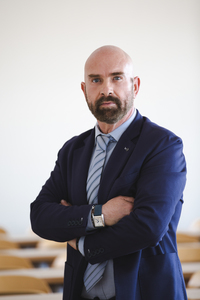Δημήτριος Μπελιάς
 | Κτίριο: Διοίκησης Επιχειρήσεων Γραφείο: Email: dbelias@uth.gr Τηλέφωνο: 2410-684636 https://scholar.google.gr/citations?user=6R1NIbIAAAAJ&hl=el https://www.scopus.com/authid/detail.uri?authorId=57216141338 |
Γνωστικό αντικείμενο
Οργάνωση και Διοίκηση Υπηρεσιών στην Τουριστική Αγορά
Ερευνητική Εξειδίκευση
Οργανωσιακή Συμπεριφορά, Οργάνωση και Διοίκηση Υπηρεσιών, Ποιότητα Υπηρεσιών, Τουριστικό Μάνατζμεντ και Μάνατζμεντ Φιλοξενίας
Περίληψη Βιογραφικού Σημειώματος
Ο Δημήτρης Μπελιάς είναιΕπίκουρος Καθηγητής στο τμήμα Διοίκησης Επιχειρήσεων, στη Σχολή Διοίκησης και Οικονομίας του Πανεπιστημίου Θεσσαλίας, με γνωστικό αντικείμενο «Οργάνωση και Διοίκηση Υπηρεσιών στην Τουριστική Αγορά». Τα ερευνητικά του ενδιαφέροντα εστιάζονται στους τομείς : Μάνατζμεντ, Διοίκησης Ανθρωπίνων Πόρων, Οργανωσιακής Συμπεριφοράς, Διοίκησης Τουριστικών Επιχειρήσεων, Εκπαιδευτικής Διοίκησης και Ποιότητας Υπηρεσιών. Έχει δημοσιεύσει 1 βιβλίο, 52 κεφάλαια σε βιβλία σχετικά με την Διοίκηση Υπηρεσιών, την Οργανωσιακή Συμπεριφορά και του Τουριστικού Μάνατζμεντ, 70 άρθρα σε εθνικά και διεθνή περιοδικά με σύστημα κριτών, ενώ έχει περισσότερες από 70 ανακοινώσεις σε συνέδρια στην Ελλάδα και το εξωτερικό. Το έργο του έχει διεθνή αναγνώριση καθώς έχει περισσότερες από 1.700 αναφορές, i 10 index 28 (PorP). Είναι μέλος ελληνικών και διεθνών επιστημονικών ενώσεων και κριτής ελληνικών και διεθνών επιστημονικών περιοδικών.
Επιλεγμένες Δημοσιεύσεις :
1. Belias, D., Vasiliadis, L., Rossidis, I. (2021): The Intention and Expectations of Modern Robotic Technologies in the Hotel Industry, Journal of Quality Assurance in Hospitality & Tourism, https://doi.org/10.1080/1528008X.2021.1995566
2.Belias, D., Rossidis, I., Papademetriou, C., Mantas C. (2021). Job Satisfaction as affected by Types of Leadership: A Case Study of Greek Tourism Sector. Journal of Quality Assurance in Hospitality & Tourism. Volume 22 – Issue 2. https://doi.org/10.1080/1528008X.2020.1867695
3. Belias, D., Rossidis, I., Papademetriou, C., Lamprinoudis N. (2021). The Greek Tourism Sector: An analysis of Job Satisfaction, Role Conflict and Autonomy of Greek Εmployees. Journal of Human Resources in Hospitality & Tourism. Volume 21 #2 https://doi.org/10.1080/15332845.2021.1959825
4.Belias, D., Papademetriou, C., Rossidis, I., Vasiliadis L. (2020). Strategic Management in the Hotel Industry: Proposed Strategic Practices to Recover from COVID- 19 Global Crisis. Academic Journal of Interdisciplinary Studies. Vol 9, No 6, November 2020. Page No 130 – 138 https://doi.org/10.36941/ajis-2020-0117
5. Rossidis, I., Belias, D. (2021). Evolution of E-Governance in the era of the pandemic. May the crisis become an opportunity?The cases of Cyprus and Greece. The Cyprus Review. (Article in Press)
6. Belias D., Vasiliadis L. (2021) Pilot Study for Two Questionnaires Assessing Intentions of Use and Quality of Service of Robots in the Hotel Industry. In: Katsoni V., van Zyl C. (eds) Culture and Tourism in a Smart, Globalized, and Sustainable World. Springer Proceedings in Business and Economics. Springer, Cham. https://doi.org/10.1007/978-3-030-72469-6_36
7. Belias D.,Rossidis I. (2021). “Corporate Leadership and Corporate Culture in start-up companies”. Chapter in: Corporate Leadership and Its Role in Shaping Organizational Culture and Performance. IGI Global, 2021. doi: 10.4018/978-1-5225-8266-3.ch003
8. Koutiva M., Belias D., Flabouras I., Koustelios A. (2020). The Effects of Workplace Well-being on Individual‟s Knowledge Creation Outcomes. A Study Research among Hotel Employees. International Conference on Strategic Innovative Marketing and Tourism. Kavoura A. (Eds.),. Springer Proceedings in Business and Economics. pp 1063-1072 https://doi.org/10.1007/978-3-030-36126-6_118
9. Belias D., Vasiliadis L., Mantas C. (2020) The Human Resource Training and Development of Employees Working on Luxurious Hotels in Greece. In: Katsoni V., Spyriadis T. (eds) Cultural and Tourism Innovation in the Digital Era. Springer Proceedings in Business and Economics. Springer, Cham. https://doi.org/10.1007/978-3-030-36342-0_49
10. Belias D., (2020). Research Methods on the Contribution of Robots in the Service Quality of Hotels. International Conference on Strategic Innovative Marketing and Tourism. Kavoura A. (Eds.),. Springer Proceedings in Business and Economics. pp 939-946 https://doi.org/10.1007/978-3-030-36126-6_104


